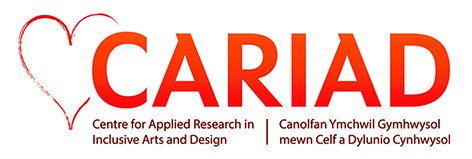We have changed the format of our CWTCH to enable more of our researchers to participate in the CARIAD community. We now host two events per term, one being an interdisciplinary workshop and the other being more reflective with short presentations of research interests followed by discussion.
December 2019
Although we have met informally over the year, we used the last CARIAD Cwtch of 2019 to welcome new staff researchers, PhD and Masters students. With everyone presenting two slides on research interest, challenges, methods and knowledge we identified many synergies and opportunities for mutual support and collaboration.
November 2016 CWTCH
‘Research and making are two ways of thinking that continually intercept one another. They are rolling practices, often convoluted, snaking, twisting and coiling together. Neither linear nor continuous, they involve a process of doing and redoing. It is an awkward, fascinating, uncomfortable and irritating process and sometimes completely unsuccessful. Ideas surface slowly, glimpsed intermittently, as if seen at the bottom of a very murky pond. Fishing without a net.’ Alyson Brien
We were really delighted to be joined by Professor Jeff Wallace, from the School of Education. Jeff talked about his research interest in bibliotherapy, and as usual sparked lots of ideas in all of us. Jeff describes bibliotherapy as the use of literary texts – for example novels, short stories, poetry – for broadly ‘therapeutic’ purposes, within carefully selected contexts. Its principle of inclusivity is based on group practice and on reading aloud. The novelist Blake Morrison describes bibliotherapy as “an experiment in healing, or, to put it less grandiosely, an attempt to see whether reading can alleviate pain or mental distress.” No ‘critical’ prescriptions are made; instead, the space for reflection on texts offered by bibliotherapy is open, requiring only the sharing of responses for the purposes of mutual support and understanding.
We also welcomed artist Sue Hunt, who has been conducting fantastic inclusive arts projects in China, India, Australia and Zambia.
Dr Taslima Begum discussed a topic emerging from her PhD research published in 2015, namely: “How the usability, aesthetic and symbolic characteristics of artefacts can unwittingly contribute to the privilege or marginalisation of people from particular socio-cultural backgrounds.”The work proceeds from the premise that design is not intrinsic to a product but the result of a myriad different forces and factors acting on it externally including hegemonic potencies. By reinterpreting technological formations in light of research emerging from post-colonial studies, it attempts to broaden our intellectual understanding of how product design in theory, practice and education can often rely upon western [hegemonic] aesthetic and deep cultural archetypes.
The research claims that current design practice often leads to culturally determined – rather than universal – conceptions in design and it attempts to re-conceptualise design as practice within a necessarily hegemonic culture. This hegemony needs to be acknowledged and redressed via increased awareness and changes to the intellectual heritage and autonomy of West European and American industrial design, in its dialogue, practice and pedagogy. As an epistemological project to identify knowledge within this discourse, it suggests new methodological and strategic approaches to engage with the crisis the discipline faces in light of globalisation so as to open up future discussions in design discourse and give a voice to the many silences that make up the noise of the world.
Her thesis entitled ‘A Postcolonial Critique of Industrial Design: A critical evaluation of the relationship of culture and hegemony to design practice and education’ is available to read at: https://pearl.plymouth.ac.uk//handle/10026.1/3410
